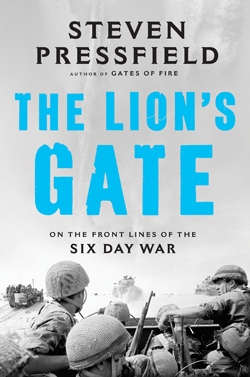The Lion’s Gate; On the Front Lines of the Six Day War by Steven Pressfield; Sentinel/ Penguin, (c) 2014. ISBN 978-1-59523-091-1, 430 pages including index and bibliography, $29.95.
By Dorothea Shefer-Vanson

 MEVASSERET ZION, Israel — ‘The Lion’s Gate’ is a fascinating attempt to present the events before and during the Six Day War of June 1967, when Israel’s forces (the IDF) overcame the armies of Egypt, Syria and Jordan, thus staving off what the Arab leaders had proclaimed as the imminent annihilation of Israel as a country and the extermination of its Jewish population.
MEVASSERET ZION, Israel — ‘The Lion’s Gate’ is a fascinating attempt to present the events before and during the Six Day War of June 1967, when Israel’s forces (the IDF) overcame the armies of Egypt, Syria and Jordan, thus staving off what the Arab leaders had proclaimed as the imminent annihilation of Israel as a country and the extermination of its Jewish population.
The author has eschewed conventional historical narrative, preferring to interview participants and elicit first-hand, blow-by-blow accounts of the progress of the war on the various fronts as experienced by individual soldiers in the different Israeli brigades. This approach gives the reader a vivid – almost immediate – sense of participation in the actual events as undergone by individual pilots, soldiers in the field, officers, generals, reconnaissance operatives and even journalists and photographers.
The book adheres to an approximation of consecutive sequence, though as so many diverse and widely-dispersed developments were unfolding more or less simultaneously the description of the course of events is inevitably somewhat haphazard. What emerges from the various voices, which are quoted verbatim, as it were, is the frustration of the fighting forces in the period before the fighting broke out, the courage, the sense of urgency and the dedication of all those involved, the chaos and need for improvisation in the course of the fighting, and the enormous feeling of closeness experienced by men who had trained, fought and edured battle together, true brothers-in-arms. Two slogans ‘ein brera’ (no alternative) and ‘dvekut bematara’ (adhering to the objective) stand out as the motivating force behind the actions of both the individual soldier and the IDF as a whole. But another concept that lay behind many of the actions of the commanders and the soldiers was ‘balagan’ or chaos, which enabled many military incidents to develop in ways that had not been foreseen.
The accounts that emerge through the statements given by the participants also incorporates their philosophical musings about the battles, the nature of war, and their feelings in general. Thus, at one point we encounter this quote from Moshe Peled, the deputy commander of a company striving to surround and enter east Jerusalem: “What is our advance like? Little wars… all over the field. A house, a bunker, a machine-gun position. Each one is a war that is fought by a platoon, a section, sometimes just three or four men. What keeps them together? They are friends – simple as that.”
The fog of war features prominently in the various accounts, the opportunities missed, the mistakes made, the wrong turnings taken by tanks, the accidents, the friendly fire incidents, no failure on the part of the IDF is omitted. But the combat on the ground was preceded by massive and carefully-planned lightning strikes by Israel’s Air Force, and these played a crucial role in determining the outcome of the war. The seminal role played by Moshe Dayan, who was appointed Minister of Defence just a few days before the hostilities began as a result of public pressure placed on Prime Minister Levi Eshkol, features prominently in the book, using exerpts from his own writings.
Many of the developments of the war were unexpected. The rapid disintegration of the Egyptian forces entrenched in the Sinai Desert enabled the IDF to advance to the Suez Canal; the fervent determination of the commanders and soldiers of the paratroop brigades to enter the Old City of Jerusalem overcame the disbelief and initial resistance of the politicians and their superiors; the pleas of the residents of the kibbutzim in the Jezreel Valley, which for years had been the target of Syrian troops situated on the Golan Heights, motivated the commanders in the field to spur their men on to take the forbidding plateau.
Contemplating the IDF victory in the Sinai, Cheetah Cohen, commander of a helicopter squadron, says: “I feel sorry for the Egyptians. The poor foot soldiers, most of whom are simple fellahin – peasants from the delta – have been abandoned by their officers. They straggle westward in columns of fifty or a hundred, sometimes tens and pairs and even individuals, barefoot and bareheaded. God knows what they are suffering from thirst and heat, grief and shattered pride.”
While the cost of the war in Israeli casualties was not high in relative numbers, each and every man killed represented a devastating loss to his comrades, friends and family, and the book concludes with a list of the ten men of the Reconnaissance company of the 7th Armored Brigade decorated for valor or distinguished service (three of them posthumously) and the 16 men who were killed in action.
My one quibble is with the apostrophe in the book’s title. The Hebrew term for the gate refers to lions in the plural, not just one. And there were, indeed, a great many lions in the epic event that was the Six Day War.
*
Dorothea Shefer-Vanson is a freelance writer, author, and translator based in the Jerusalem suburb of Mevasseret Zion. She may be contacted via dorothea.shefer@sdjewishworld.com … San Diego Jewish World seeks sponsorships to be placed, as this notice is, just below articles that appear on our site. To inquire, call editor Donald H. Harrison at (619) 265-0808 or contact him via donald.harrison@sdjewishworld.com